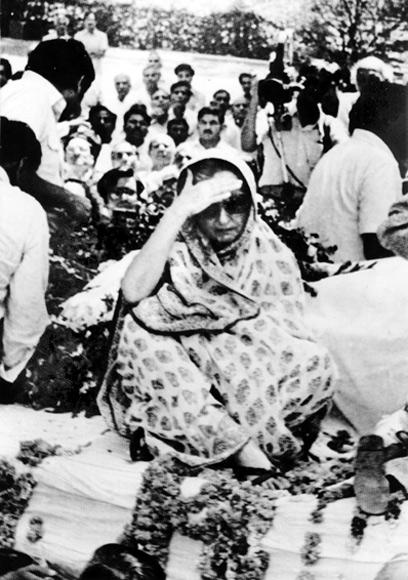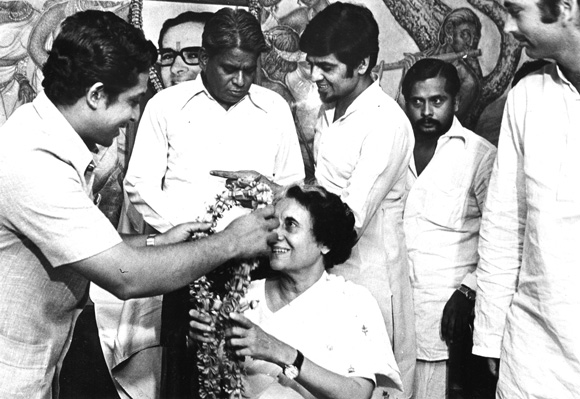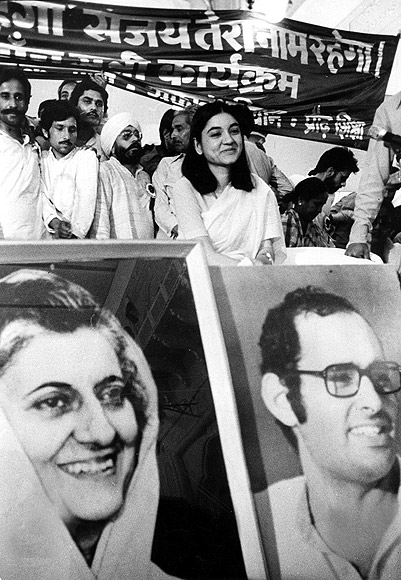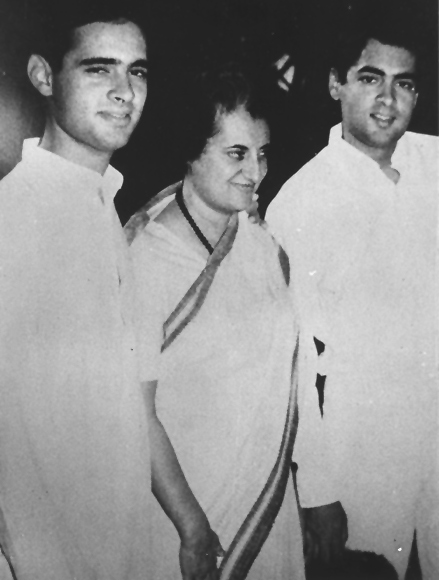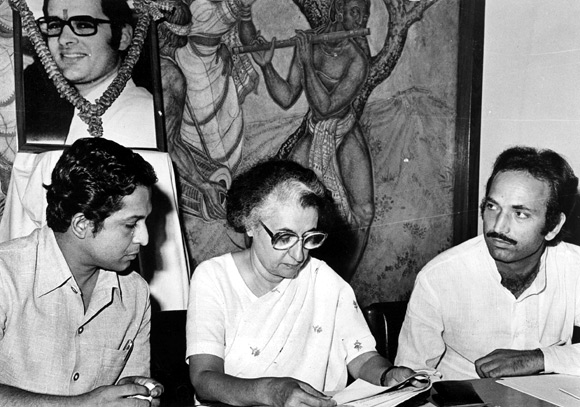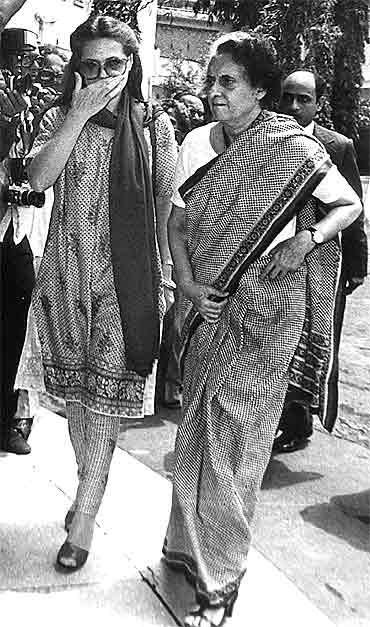 | « Back to article | Print this article |
'Sanjay Gandhi was the king of India; his mother was No 2'
'There was a court around Sanjay Gandhi; there is now a court around Sonia Gandhi. I think there's still a great belief in the Congress that one way to rise in the party is to be utterly and totally loyal to the Gandhi family,' Vinod Mehta tells Rediff.com's Saisuresh Sivaswamy.
"I didn't see The Sanjay Story as an overtly a political book," Vinod Mehta tells Rediff.com's Saisuresh Sivaswamy.
"I saw it as a narrative of how a kid who was 30 or 31 years old could, in a country like India, sit in the prime minister's house, rule the country and cause such havoc."
Please click here for Part I of this insightful interview: Is Narendra Modi another Sanjay Gandhi?
One thing that struck me about the book is that, when you wrote it 30 years ago, you were not a political writer. Yet you went on to produce an amazing picture of a politician at the centre of the news. How did that happen?
When I was offered the book, one of the attractions was -- how did this person get away with so much? And what kind of person was he that, for about 16 months, he was the czar and king of India and his mother was number 2?
This intrigued me.
The politics came in, but I didn't worry too much about it. I wrote it as a narrative; that's why I call it The Sanjay Story. It seems like a simplistic title, but I wrote it as the rise and fall of Sanjay Gandhi.
I didn't see this as an overtly a political book. I saw this as a narrative of how a kid who was 30 or 31 years old could, in a country like India, sit in the prime minister's house, rule the country and cause such havoc.
Please click NEXT to read more...
'The terms Sanjay set were terms no respectable writer would accept'
Access was an issue to the extent that the main person (Sanjay Gandhi) refused to give me access.
That was my great regret.
The terms he set for the access were terms no respectable writer or biographer would accept.
I went to the extent of suggesting I would show him the bits where I quoted him in the book.
I even said if he wanted me to meet a particular person who would present his side of the story, I would do so.
Actually, before I met him, I met all those people who were close to him. I got his part of the story from them.
Rukhsana Sultan, Jagdish Tytler, Kamal Nath, Ambika Soni -- all these people were close to him.
When I made my offer to Sanjay, I told him I had already spoken to these people so I had his part of the story.
If I was going to write a loaded book, I'd only meet the critics.
I did meet the critics too, but I also met people who were his lieutenants. But it cut no ice.
Please click NEXT to read more...
'This remains the only biography of Sanjay Gandhi'
How long did the process take -- meeting all these people and writing the book while holding your main job as well?
About four months (laughs).
In four years, I had managed to create a system. Besides, I had assistants.
By 1978, whether it was a good magazine or a bad one, Debonair's new character had been established.
I wasn't having the kind of problems I was having in 1974 about getting people to write for the magazine.
I mean, the pictures were a problem and they remained a problem from 1974 to 1981, so that was not the issue.
But asking (poet, playwright, editor and art critic) Nissim Ezekiel, for example, to review a book was not as big a problem in 1978 as it was in 1974.
Sometimes Nissim himself would call up and say, 'Listen, I have read this good book, can I review it for you?'
People who I wanted in Debonair wanted to write for the magazine. To that extent, it became a little easier so I had some time.
Also, nobody took me seriously as a journalist in 1974. I was hoping this biography would help establish my credentials as somebody who went beyond editing a girlie magazine.
I am not self-important in many ways, but I take myself seriously as a professional.
That was the case with Debonair as well. But I had very little success.
I was very keen to write this book because I was writing a very serious book on the Emergency and a biography of Sanjay Gandhi.
This remains the only Sanjay Gandhi biography. There are books on the Emergency, but there is no biography of Sanjay Gandhi. That was the other spur goading me towards this book.
Please click NEXT to read more...
'Sanjay and Rajiv never got along. And that's putting it mildly!'
There are many names we think of as respectable today; one has almost forgotten the dubious role they played then, during the Emergency. Your book brings back those memories.
The Shah Commission did bring much of that out, but public memory is short.
What happened after the Emergency when the Congress lost power, and after Sanjay Gandhi died three months after the Congress gained power...
Sooner rather than later, people knew that Rajiv Gandhi would take over.
People transferred their allegiance seamlessly from Sanjay to Rajiv, although Sanjay and Rajiv never got along. And that's putting it mildly!
Ambika Soni, Kamal Nath and all those people who were with Sanjay became very friendly with Rajiv.
The only guy who did not transfer his allegiance was Akbar Ahmed 'Dumpy' who was very close to Sanjay.
But no one really paid a price for all the excesses during the Emergency, did they?
No, they didn't pay a price for it.
People like Sajjan Kumar and Jagdish Tytler who was close to Sanjay Gandhi allegedly had some role in the 1984 massacres (that took place after Indira Gandhi was assassinated). They escaped justice.
In fact, it's remarkable how many of these people instead of suffering; they have actually prospered instead of being singled out for their role in the Emergency.
Please click NEXT to read more...
'If you attack Sanjay, you are attacking me'
Apart from the many people who played a dubious role, a couple of names jumped out while reading your book.
Rajiv and Sonia Gandhi don't come out exactly smelling of roses, do they, especially in the Maruti episode?
Yeah, they don't come out well.
Not Rajiv so much... Sonia, however, had a small role in the Maruti episode. She became a director in one of the companies but she quickly relinquished that post.
When the excesses of the Emergency were in full flow, people didn't know where to go, whom to complain to. These included people like (freedom fighter) Aruna Asaf Ali and others, who were close to Indira Gandhi.
If they went to Indira, she wouldn't listen to them. She would simply say, 'People don't like Sanjay and if you attack Sanjay, you are attacking me.' She said the propaganda (against Sanjay Gandhi) was going on because people were jealous of him.
On a couple of occasions, people went to Rajiv and Sonia. These were people they had to meet because they were close to Indira. They would listen very uneasily, very uncomfortably, and wouldn't say a word.
On one occasion, Sonia reprimanded one of these people and said, 'Why do you come here and poison our ears?'
They sealed themselves in this cocoon and absolved themselves of any responsibility.
I can understand their position because Rajiv didn't get on with Sanjay anyway. And Rajiv, I think, was certainly much more aware of all the cruelties happening during the Emergency. But he knew he couldn't do anything.
More than that, I don't think he wanted to intervene.
They had a small little coterie during the Emergency -- he had his friends and he would stay within that group and not move out.
To that extent, you can blame them.
When I read about the Maruti episode in your book, I thought to myself -- there have been so many charges of venality against the Gandhi family that seem to lend credence to other corruption charges that followed. Like Bofors.
The (Maruti) project was a disaster from day one. And this chap (Sanjay Gandhi) just didn't have the skill or the organisational or managerial power to produce the car.
Indira Gandhi was very keen he do this because he would have something to do. Otherwise, he was literally roaming the streets.
All kinds of things happened... the way land was procured -- (then Haryana chief minister) Bansi Lal was one of the people who procured land -- how dummy companies were set up and how finally, when people said that the project has been on the map long enough, let's see a car, he produced one car!
It went on the road, but then it transpired the engine had been pinched from some other car!
So there was no engine!
Please click NEXT to read more...
'There was a court around Sanjay; there is now a court around Sonia'
My question actually was about venality and the family.
Did your work on the book ever give you an indication, perhaps camouflaged, that the family too was venal in a way?
Did you ever come to that kind of a conclusion?
I don't know about that.
I do know that they did, very briefly, get involved with the directorships of Maruti Technical Services or something.
The only thing which has to be said in their favour is that Rajiv and Sonia were dead against the project -- not because of the venality, but they thought Sanjay was going to make a complete mess of it. Which he did.
It was not just the relationship between the two brothers that was really very bad; it was extremely bad between the two wives (Sonia and Sanjay's wife, Maneka) as well. So I think Sonia resigned very quickly.
Does anything in the Gandhi family narrative, as it is playing out today reminds of you the Sanjay Gandhi days?
The only thing, in a slightly less oppressive way, is that the durbar or court is still there.
There was a court around Sanjay Gandhi; there is now a court around Sonia Gandhi.
I am not hostile to the Congress, but if you are any kind of journalist you will have to see that it is still a very sycophantic culture.
Perhaps it is not as sycophantic as it was at that time; then, if you opposed that culture, you went to jail. That doesn't happen now.
But I think there's still a great belief in the Congress that one way to rise in the party is to be utterly and totally loyal to the Gandhi family.
Part 3 of this fascinating interview with Vinod Mehta: 'Rahul probably hates politics more than Sonia does'
